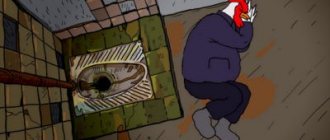Rooster men with complex personalities usually live exciting and passionate lives after marriage. In pursuit of individuality and freedom, they look very charming and become very tender and romantic when they fall in love. To pursue their loved ones, they can create romance and maintain relationships very well. In addition, male roosters can bring their partners a sense of security and a rich material life. They live well and can take very good care of every aspect of their loved ones, from body weight and diet to family health. No one can feel indifferent to meticulous Rooster men.
Prison suits
Zone suits are the division of all prisoners into unique groups that differ from each other in prison status, rights and concepts.
In absolutely any prison or colony, there is a clear distinction between all prisoners into certain groups or stripes: “thieves”, “men”, “goats” and “roosters”. There are also so-called intermediate groups, which vary depending on the specific place of deprivation of liberty. Such “intermediate” castes include “roosters”, “lowered”, “offended” and others.
The suits in the zone are fairly closed groups, and it is almost impossible to move from one caste to another.
"Authorities" of the zone
The most significant, important and honorable suit in the zone is “thieves”. This caste is the smallest, and you can’t just get into it. So, who is the “thieves”?
“Blatnye” are real, almost unlimited power in the zone. It is the members of this group who establish the unwritten rules of behavior in places of deprivation of liberty, monitor order in the zone, resolve conflict situations that arise between prisoners, and punish the “offenders” to the fullest extent of prison law.
A special group of “thieves” are the so-called thieves in law. These are recognized ones. Moreover, they do not necessarily have to trade in thefts. A “thief in law” is a person who has an impeccable criminal reputation, correct concepts and strictly adheres to
If you answer the question about,
who is such a “thieves”, then we can say that he behaves “correctly” not only in the zone, but also did not have any “jambs” in freedom. For example, “thieves” should not serve in the army; when free, they should not hold leadership positions or work in the service sector (taxi drivers, waiters). In Soviet times, such authorities were prohibited from having a family or being a member of any political party.
“Rooster” is the most mysterious word: a researcher on the origin of gang slang
The symbol of the coming year is the rooster. The wits of the RuNet joke a lot about this now, since in criminal jargon this is what they call a representative of a lower caste among prisoners.
The thieves' argot, the sociolect of the criminal world, has always aroused great interest among the public, penetrating into various spheres of public life. And this is understandable: you cannot deny him a unique expressiveness. Alexander Sidorov, a researcher of the prison world, a writer known under the pseudonym Fima Zhiganets, told Lente.ru about the most famous borrowings from this language.
Rooster falling out of favor
“In places of deprivation of liberty, “goat” and “rooster” are terrible curse words,” says Lenta.ru’s interlocutor. “With a goat, it’s still more or less clear: it’s a smelly animal, it has horns, and among prisoners they always mean something shameful.” At first, passive homosexuals were called goats, and from the 60-70s of the last century - assistants to the prison administration. But why a rooster? In folklore this is always a positive image. For example, informers are called hens and hens. This is understandable: they sit, incubate, listen. Why did the rooster get it? That’s the question.
Passive homosexuals in prison have been called this for a long time, although during the GULAG the more dialectic dialects “peven” or “piven” were in use. By the way, today the word “rooster” in prisons has a synonym - “pinch”, short for the breed of dog - pinschers. This slang word is mentioned in Igor Mikhailov’s poem “Aska”, written in 1943.
According to Alexander Sidorov, today prison and criminal jargon is a unique collection of all kinds of borrowings that have undergone certain changes. With the advent of Soviet power, intellectuals, white officers, merchants, priests, workers, and peasants found themselves in prison. And from each social layer, their own words, professional terms, and unusual phrases came into the huge melting pot of criminal jargon.
— For example, the phrase “pushing empty,” that is, conducting empty, meaningless conversations, came from miners. Empty is an empty trolley that went into the mine for coal. Another example is the “volyna”, a pistol. This is a Cossack word, it was the name of a weapon belt.
“Zhigan” is a dialectic, that is, a word from a folk dialect inherent in a certain area. The roots “zhig” and “zheg” were associated with the meanings of “to scorch,” “to burn,” “to produce a feeling like a burn,” as well as to inflict painful (“burning”) blows. At first, the word “zhigan” was associated with fire. Zhigans were the name given to stokers, distillers, and generally people stained with soot, and later this word was used to refer to “hot”, dashing people - rogues, mischievous people, swindlers. In the criminal world of Tsarist Russia, the Zhigans were highly respected; they belonged to the highest caste of fartoviks, the cream of the fartovy society.
Friar with reputation
“Sometimes they borrow foreign words,” says Sidorov. — So, according to one version, the word “freebie” came into the vocabulary of criminals from Poland. There is a Polish proverb: “You can see the lord for freebies.” A freebie is the top of a boot. The swindlers specially sewed boots with large tops and walked around the markets in them. While the accomplice distracted the merchant, the thief quietly hid the goods behind the top of his boot - he threw them off for free. Perhaps this is how the modern meaning of this word arose - for nothing, free of charge.
Freier in German means groom. In Tsarist Russia, swindlers used this name for respectable, wealthy gentlemen with a reputation - often officials who liked to visit prostitutes. Frayer could easily have become a victim of a fraudulent scheme: at the most crucial moment, her husband could have walked into the room where he was secluded with a representative of the ancient profession. And quite legal. He and his prostitute accomplice immediately made a fuss. Friar, in order to avoid a scandal and save his reputation, gave all the money to the scammers - and immediately retreated.
Photo: Pavel Kassin / Kommersant
— It’s interesting that the fraudster involved in such schemes was called a hippie or a hippie. This comes from the word “chuppah,” which is the Hebrew name for the canopy under which the bride and groom stand during a Jewish wedding,” explains the expert. — The very fraudulent method of divorcing a friend is “taking it for the hipish.” Modern words like “kipish” or “don’t boil” came from here.
Over time, fraers began to be called not only respectable visitors to brothels and victims of hipish, but in general various losers, simpletons. In the Gulag, a fraer is usually a political prisoner, an intellectual. Seasoned criminals despised them. But political prisoners of the 1960s-1980s and dissidents were already respected by criminals for their resilience and convictions. This was also facilitated by anti-communist sentiments in the criminal community.
- And the word “fraer” no longer meant burdock or sucker, as before. Now fraeras have become the suit that follows thieves, their henchmen, such romantics of the thieves’ world,” notes Sidorov.
Thieves' passions
“Thieves in law have their own vocabulary,” says Lenta.ru’s interlocutor. - Previously, they were either crowned or baptized, dedicating them to thieves. The ritual depended on religion (after all, it’s somehow strange to baptize a Muslim thief). Take the same Grandfather Hasan - he is a Yazidi, they have a special religion, that’s why they crowned him. Now they have begun to move away from this: in the world of thieves they decided that it was better not to divide the ritual into coronation and baptism, so that there would be no disputes. Now they say simply: for such and such a person the issue has been “solved,” that is, they have been consecrated as thieves. Such is the bureaucracy.
Photo: Sergey Mikheev / Kommersant
Another interesting nuance: according to tradition, a thief in law is obliged to answer affirmatively to the question whether he is a thief asked by anyone, including police officers. Thus, the criminal actually admits that he is the head of an organized crime group.
- In general, thieves in law respect traditions - but this one has a problem, since today it is clearly to their detriment. What to do in such a situation? Shakro Molodoy, for example, after his arrest, generally refused to communicate with law enforcement agencies on camera. But some thieves act differently - when asked a provocative question, they answer: “I’m with my own people.” This means I am a brother-in-law, I am with my people, with the thieves. Those in the know will understand. And there is no need for outsiders to understand this.
Jewish roots
— There is a theory that in Russian criminal jargon there are many borrowings from Hebrew, and they spread throughout the country mainly from Odessa. We had two main thieves' centers - Rostov and Odessa, Slavic and Jewish. In fact, both cities were within the Jewish Pale of Settlement. There were much more Jews in Rostov than in Minsk or Kyiv. And although 60-70 percent of Russian criminal jargon is variations of the living Great Russian language studied by Dahl, there are many inclusions from Hebrew and Yiddish in the thieves' argot.
Photo: Vasily Maksimov / Kommersant
The expert notes that there is a lot of confusion with borrowings from Hebrew. For example, some researchers believe that the word “parasha”, that is, a latrine in a cell, came from there. In fact, everything is much simpler: October 27 is Paraskeva Gryaznukha Day. Autumn, mud, rain. Praskeva is Praskovya, affectionately Parasha. “Parasha”, “parashka”, by analogy with Gryaznukha, they began to call a tub or bucket of sewage, which was carried out every day by a convict “parashnik”.
As a result, such expressions as “carry a parasha”, “yes, this is a parasha!” arose. And the Hebrew with the word “parasha” (emphasis on the last syllable) is an instruction, it has absolutely nothing to do with it.
The same applies to the word “botat” (by hairdryer) - speak in thieves' jargon. They are looking for Jewish roots in it, but they should look in a different direction. In the old days, cows were hung around their necks with a botalo - a bell or rattle. Hence the chattering - rattling, strumming, talking.
Some words in criminal jargon came from the East, says the expert. One of them is “to hang around.” Its root goes back to the Turkic word “ashmalash” - to search, shake, rob. The word “ashmanat” is mentioned in Vsevolod Krestovsky’s novel “Petersburg Slums”. And it gave rise to the now common “shmonat” and “shmon” in the criminal environment.
15
Foremost
The leader of the "thieves" is the "godfather" - a recognized criminal authority. If there is no such person in the zone, then a “supervisor” is appointed - a prisoner who performs the functions of a leader.
The “godfather” and his associates (that is, the “thieves”) have special privileges in the zone. They may not work and keep whatever they deem necessary from the common fund.
In the modern world, many “thieves” in the zone interact with the administration and establish those orders that are beneficial to the leadership of the colony. In return, the “thieves” are given comfortable living conditions (they secretly receive alcohol, marijuana, telephones and other benefits). Although this does not correspond to thieves’ concepts, market relations now reign in the zone.
What Women Do Rooster Men Like?
1) Intelligent and graceful
Having good taste in fashion, Rooster men know how to dress up and are easily attracted to intelligent and graceful women, but do not like sloppy ones.
2) Diligent and thrifty women in housekeeping
For Rooster men, family is of great importance. They hope that their partners can also be family oriented so they can have something in common and feel like they are like-minded. Because of this, they like women who diligently and carefully run the household, and do not like those who take home a hotel.
3) Smart and beautiful
Most Rooster men are handsome and want to marry beautiful women who can match them. In addition, Rooster men are smart, prudent and gifted at managing money and hope that their partners can be the same. Because of this, they do not resist smart and beautiful women in everyday life.
Who is "the man"?
“Men” are perhaps the largest and most neutral group of prisoners. It includes prisoners who received sentences for committing minor crimes. As a rule, these are completely random people in prison: having entered the zone once, they try to get free as quickly as possible and return to normal life in the wild.
Among the “men” there are, of course, prisoners whom the “thieves” respect and even listen to their opinions.
This group of prisoners is considered neutral and quite large. And if we talk about who a “man” is, this is the prisoner who, at the end of his sentence, will forget everything like a “bad dream” and will try not to return to the zone again.
"Goats" is...
If it is an honor to belong to the two stripes described above, then to be included in the caste of “goats” means to put yourself against the rest of the prisoners. As a rule, this suit includes those prisoners who, of their own free will (and in some cases, under duress) began to cooperate with the administration of the correctional institution.
So, if a prisoner agreed to take the position of a prison librarian or caretaker, then he automatically fell into the caste of “goats”. Convicts belonging to this suit actively cooperate with prison management, carrying out all their instructions. In this regard, the rest of the prisoners treat them as traitors.
This situation deprives the “goats” of the right to participate in prison disputes, they are not allowed to enter the “common fund”, they do not have the right to vote. Meanwhile, you can greet representatives of this suit, you can touch them and, if desired, you can communicate with them.
How to Find Out How Much a Rooster Man Loves You
Your Rooster guy childishly wants to attract your attention with something boring. If you want to know how much he loves you, just check if he lets you manage the wallets. For the Rooster man, money equals life. If he gives you all his money, he will give you his life. Only if he has carefully observed you and identified you as a person he can trust can he hand over his money to you. Once he is sure that you will not run away with the money, but will spend your whole life with him, he will feel relieved to give his life to you. If you control his wallet, it means he loves you the most and will stay with you forever.
You wouldn't wish it on your enemy
The suits in the zone are unchanged. You cannot move from a lower caste to a more authoritative one. So, a “goat” will never become a “man” or a “thieve.” But you can get into the lowest caste.
A suit like “rooster” is a real nightmare for a prisoner. For prisoners who fall into this caste, life in the zone is not easy, to put it mildly. This group of prisoners is also called “offended”, “dismissed”, “untouchables”. This suit includes passive homosexuals and prisoners punished by having sexual intercourse with them. Moreover, the sexual act itself may not take place: the prisoner can simply pass the genital organ across the lips, and from that moment on he will be considered a “rooster.”
Representatives of this suit are outcasts: you cannot touch them, you cannot take anything from them. “Roosters” use separate utensils and have a separate sleeping place (usually at the entrance to the cell). It is not customary to talk to them. “Roosters” are prohibited from approaching other prisoners closer than three steps. They are the ones who do the dirtiest work in prison - they clean toilets and wash the parade ground.
However, when “roosters” are “consumed” (this is what they say in the zone), this is not considered any kind of defiling contact.
There is also an ominous “tradition” of making holes in plates, spoons and mugs of “roosters”. In order for a prisoner belonging to this caste to eat or drink, it is necessary to plug the holes with his fingers. And this is the most harmless humiliation of those to which the “roosters” are subjected.
Prison laws are very strict and cruel. Therefore, the slightest deviation from established norms of behavior inevitably leads to punishment. Thus, having once become a “rooster”, a person is deprived of the right to human treatment in prison and is subjected to humiliation until the end of his sentence. Not everyone can withstand this, which is why many prisoners who fall into the “rooster” caste commit suicide.
Sometimes it happens
The above-mentioned suits are available in all zones and prisons. However, some have their own specific, so-called intermediate castes.
There are especially many such castes in the zone where juvenile criminals are kept. On the “youngster”, in addition to the castes already indicated, there are such suits as:
- “forshmaki”, which includes prisoners who have committed some minor offense in the zone due to ignorance of the rules and norms of behavior;
- “devils” - that is, those prisoners who were caught stealing from their cellmates;
- “shnyri” who act as servants;
- “laundresses”, “oil presses”, “shortages” and others.
In some adult zones, unique podcasts are common. For example, “thieves”, which includes prisoners who form the “retinue” of the “thieves” (while they themselves are not criminals). Or the “scoundrels” caste, which includes “thieves” prisoners who have committed some disgusting act.
Live “according to concepts”
Whatever suit the prisoner belongs to, he is obliged to comply with Zonov’s concepts. Concepts are established standards of behavior for prisoners in places of deprivation of liberty. Strict adherence to these unwritten rules helps to avoid conflict and sometimes life-threatening situations.
Prison laws (or concepts) are very similar to the norms of life in freedom. The paradox is that often prisoners who violated the law in freedom (for example, stole), in places of deprivation of liberty strictly adhere to the “don’t steal” rule.
Zonov’s basic concepts boil down to the following: don’t “knock” and don’t steal from your own people (that is, from fellow prisoners), don’t let “words go to waste” (if you threaten someone, you must punish them; otherwise, they will punish you for chattering) .
In the zone, you cannot interfere in other people’s affairs and conversations, impose your opinion, lie and swear (since the demand for any spoken word in prison is much greater than in freedom).
You shouldn’t be greedy in prison: it’s customary to share with your fellow inmates. And, of course, you shouldn’t put yourself above others, because this can lead to dire consequences.
What does striding mean in jargon?
Walking in step with the trash—being an activist, an asshole, a knitter—is an act. There is an exodus - this can only be said about a decent prisoner (everything is equal in life), who devotes to the general, in relation to others it is said “they are useful.” Pay attention - give (give) something to a general person or to someone individually.
Interesting materials:
How to see your avatar in Viber? How can I view my work record? How to see all photos on Apple Watch? How to view all emails from one sender? How to view all pages in Excel? How to view all accounts on a computer? How to put a date in an Excel table? How to put the disk first in the BIOS? How to tick a symbol? How to place a page horizontally in Word?
Strange norms
Some zones have very strange laws. This is especially true of colonies that house juvenile offenders. For example, you cannot lift anything from the floor, you cannot finish smoking a cigarette behind prisoners who are members of lower prison castes.
There are some prisons where they can let you go just because a prisoner went to the toilet and didn’t wash his hands or mended his socks.
There are also colonies in which it is customary to wash in the bathhouse with two washcloths - one to the waist, the second for everything else. A towel, which is commonly called a “waffle” towel, is considered a “checkered towel” in the zone. And it will be very bad for the prisoner who does not know this rule.
The "red" zone. Black zone
Not only the prisoners themselves are divided by color, but also the places where they are kept. All zones are divided into “black” and “red”.
“Reds” are those prisons in which rigid “cop” concepts prevail. In such prisons, interaction between prisoners and the administration of the correctional institution is strongly encouraged. Life here proceeds according to the rules of the zone leadership.
“Black” prisons (which are the majority in Russia) are those correctional institutions in which everything is based on thieves. Here the suits in the zone are of great importance. It is considered a waste to cooperate with the administration of such a colony.
In the “black” zones, prisoners who “knock” to the management are classified as “goats” (they are also called “red”). “Red” in the zone will never be able to live in peace, since he will be hated by all other prisoners and will be considered a traitor.
Finally
Over many decades, clear and strict rules and norms of behavior for prisoners have been formed in places of deprivation of liberty. Violation of established rules leads prisoners to punishment, which most often consists of transfer to the lowest prison caste.
And if for an ordinary law-abiding citizen such a punishment seems childish, then for the inhabitants of the zone it is the most severe and severe punishment. After all, the safe and calm serving of a sentence directly depends on what color the prisoner belongs to.
Despite the fact that modern society and worldview have introduced many innovations into prison life, there are things that still remain unchanged - these are prison castes (suits), thieves' laws and concepts.
The main feature of this caste is passive homosexuality: voluntary or forced.
But not every rooster regularly practices homosexual relations.
How does a Rooster Man Maintain a Love Relationship?
Men born at the age of the Rooster are very complex in character, partly very pragmatic, and partly fixated on softness and sweetness. Rooster men would pay the least to win the most economical beauty and would prefer women who are gentle, generous, beautiful and capable. It may seem bizarre, but they really mean it. So one can imagine that they have difficulty in achieving their desire. In fact, love is neither unconditional nor conditional, and it depends on feelings. Therefore, male roosters are encouraged to pay more, be more sincere and less calculating in order to better maintain romance.
Roosters in prison - who are they?
Those excluded from prison life are a caste of untouchables. How do people living in prison live?
They live separately from full members of the prison community: under the bed (“under the bunk”), near the toilet.
In large camps, separate barracks are allocated for them, which are called cockerels.
Those who are omitted use individual household items.
Holes are made in their dishes so that no one accidentally confuses “grinded” plates and spoons with normal ones.
Life for those in prison is very difficult. Roosters do the dirtiest types of work.
There are several theories about the origin of this caste.
According to the most common version, those released were separated into a separate prison stratum after the 1961 reform.
She divided the camps according to the severity of the regime of detention: seasoned prisoners, repeat offenders began to live separately from the pioneers (you can find out what types of prisons exist in Russia today and what regimes there are there).
The pioneers are, as a rule, young people striving for competition in all spheres of life; they did not know the principles of prison and, in the absence of supervision by more experienced prisoners, their life became more and more wild over time.
This has led to the fact that punishment by rape, which before the reform was an extreme measure used in isolated cases, has become widespread (read about types of violence in prisons).
Any prisoner can become omitted.
These include:
- People who practiced homosexual relations in the wild.
- Prisoners who were sent to prison for raping minors.
- People whose relatives work in law enforcement agencies.
Reference:
In addition to roosters, there is a caste of devils in the prison community. The lowered devils share the status of untouchables, but they are not used for sexual pleasures.
Automatic lowering is becoming less and less common in prisons. The attitude towards people imprisoned under “rooster” charges will not be good, but sexual violence will not be shown towards them.
Why is it called a rooster in prisons? There is no exact answer to this question. Probably, this name comes from the verb “cock”, which denoted the process of rape.
Man of the Year Rooster - career
A man born in the year of the Rooster is not very lucky and has to work hard to achieve success. in addition, his temper and lightness of character, which, for a strange circumstance, easily coexist in the soul of this man, may prevent him from achieving a dizzying career. In work matters, the Rooster man is very careful and prudent. If he occupies the manager’s chair, he first carefully studies all the details, and only then begins to make serious decisions.
A Rooster man in the boss's chair is not a very good option for subordinates. He is overly power-hungry and loves to criticize, and does not listen at all to the advice and recommendations of others. He believes that he knows everything better than others, and in the whole world you cannot find a better specialist than himself. It is simply impossible to dissuade him from naive and impractical goals, and his subordinates will have to deal with the consequences.
But if the Rooster man is an ordinary employee, then there will always be laughter and cheerful, lively communication in the team. Men born in the year of the Rooster love compliments and attention from others. They are susceptible to flattery, generous and always ready to help. They are observant and always ready to suggest a reasonable way to solve a problem. It is not surprising that many turn to them for help.
He begins his professional activity very early, because he is ambitious, self-confident and strives for independence. It is difficult to find a profession that a Rooster man cannot cope with. His hard work, diligence, determination, as well as administrative abilities, desire to command and manage help him achieve good results. The Rooster man is a talented organizer, careful and plans everything in advance. His desk is always in order, all things are in their place, and documents are kept in strict order.
In work, the Rooster man always tries to do more than he can and takes on tasks that exceed his strength. Therefore, the plans he has in mind are not always realized. In addition, the Rooster man is a famous braggart; he likes to show great expectations, but does not live up to them. Despite the obvious abundance of fresh ideas, he implements them very poorly. In everyday life it’s the same thing - a lot of ideas and no hope of realizing them.
The Rooster man approaches any work very responsibly, but avoids taking on unnecessary obligations. If necessary, he is able to help others, but he will do it in such a way that others will properly appreciate his action. At work, as a rule, he is valued and respected, although they are wary of his frankness and uncompromising nature in communicating with his superiors, as well as his reluctance to take on more than what is required by his position.
A man born in the year of the Rooster is characterized by sharp ups and equally sharp downs. In his life, streaks of success alternate with streaks of failure. His professional life is unstable and he often changes one profession to another, not thinking much about the future and living in the present moment.
As a rule, the Rooster man has a fairly flexible worldview that helps him cope with adversity and need, and financial success and career advancement are only companions to the growth of personal prestige. And for men born in the year of the Rooster, it is very important. They love to receive awards and medals.
However, almost every Rooster man sooner or later experiences one or more crises. This is the fate of most Roosters, since crises help them renew themselves internally. Starting everything from scratch, from the very beginning - this is the missionary role of the Rooster man. In addition, such an update makes it possible to try something unknown for yourself, to realize yourself in a new field. It can even be said that many Rooster men themselves subconsciously lay a time bomb under their projects.
Men born in the year of the Rooster rarely have big money. He does not know how to save money and invest it, and quickly spends everything he earns on household needs. But, if the Rooster man is still able to find his purpose and realize himself, then he can achieve good financial well-being. When it comes to work, the Rooster man hates routine and likes it to be accompanied by travel and a certain amount of independence.
He will be able to prove himself most effectively in professions related to organizing large meetings, corporate events, exhibitions, presentations, and competitions. In this area, most men born in the year of the Rooster turn into peacocks and create beauty salons, fashion collections, etc. They demonstrate their own brilliance and talent and help others realize themselves.
His favorite business will give him everything he dreams of: money, prestige, personal freedom and independence. He just needs to be the center of attention, a generator of ideas, and then he will be able to make his own career, which will help him open up in society. But if he does not have such ideas and an appropriate assistant, then he turns into a selfish, stubborn person, fixated on his own problems.
Many Rooster men love to chair meetings, demonstrating the ability to present themselves and express their opinions. And the Rooster is a good speaker. Therefore, the Rooster man is able to manifest himself most fully in the role of an intermediary between the audience and the speaker. He may be the best entertainer ever.
Feeling this, many men born in the year of the Rooster choose professions based on collective creativity. But it is worth remembering that he is more of a tactician than a strategist and rarely learns from his mistakes and generally does not learn lessons for the future.
For the Rooster man, both self-esteem and the assessment of others are very important; he wants to be the best in everything. Men born in the year of the Rooster try not to show such character weaknesses as uncertainty, weakness, timidity, which often visit them. They disguise them with eloquence, chic appearance, and tireless energy.
What are they doing?
Contrary to the stereotype, the proportion of voluntary homosexuals among those offended is low.
Most prisoners become cocks for offenses unrelated to the sexual sphere.
Below is what people are put in prison for. Usually these are various serious violations of the rules of prison life:
- Failure to pay card debt. Unrepaid debts in prison have to be paid in blood, and the only alternative to save life is the provision of sex services.
- Body contact with another rooster outside of sexual intercourse.
This rooster is punished very cruelly after such incidents (even to the point of being killed), but the person with whom he came into contact never ceases to be degraded. The offended, driven to despair, often take advantage of this for the purpose of revenge. Sometimes physical contact is not necessary - just spending the night in the cockpit is enough. - Weakness of character, inability to stand up for oneself. For some things (for example, for sending to ...) you must definitely ask for an answer. If the offended party does not do this, then it may lose all its authority and move into the category of the offended.
- Snitching.
- Stealing property from other prisoners.
- Putting another person down without a good reason.
- Cute appearance, high-pitched voice, affectation - these factors increase the likelihood of getting a residence permit in the rooster's corner.
Release can also be carried out by order of the prison administration to remove unwanted prisoners from prison life.
The most popular method is to lock the prisoner in a cockerel at night.
But the attitude towards such neglected people in the prison community is more loyal.
The 2000s and beyond have seen a shift away from descent by rape.
This is due to increased control over the internal regulations of correctional institutions, and greater attention has been paid to protecting the rights of prisoners.
Briefly about how to avoid becoming a rooster in prison:
- Watch your words. Do not reveal unnecessary details of your sexual and personal life, do not offend anyone without reason.
- Have pride. Be able to stand up for yourself and demand a response from the offender.
- Minimize contact with roosters.
This includes refraining from participating in their beatings and rapes. Even in prison you need to remain human, and humanity is valued there. - Do not steal from your own people, do not snitch, do not cooperate with the administration.
Rooster Man - Personality Characteristics
The Rooster man is a very attractive and extraordinary personality. As a rule, he is well and expensively dressed, well-groomed and gallant.
The Rooster man can present himself well, takes care of his appearance, and often takes care of physical training that keeps his body in excellent shape. He loves to be the center of attention, especially from women, and entertain them with witty jokes.
Many women are simply delighted with him. And this is not surprising. After all, a bright, impressive and charming Rooster man knows what to say and when to say it in order to please women.
He struts around, spreading a magnetism that attracts and excites. But, unfortunately, the personal life of the Rooster man can be very stormy - for various reasons. According to the eastern horoscope, at a young age the Rooster man will not be able to create a happy family; only in his mature years is he able to find happiness.
It is worth noting that the Rooster man needs to always be in sight, in the center of attention, only then does he feel like a human being. He needs an exchange of energies. And when they forget about him, he feels bad, and he may even fall into a prolonged depression.
The Rooster man loves to command and hates to obey, either at work, among friends, or in the family. He considers himself right in all matters and his opinion is the ultimate truth. Entering into an argument with him is useless and even fraught with consequences. The Rooster man is not shy in his expressions, does not care about the feelings of others and can say whatever he wants to his face. Sometimes it’s easier to agree with him, otherwise he will start to get cocky and may cause a scandal.
The Rooster man loves to make comments to others (even to the point that he can tell a girl that this hairstyle makes her look old), but he himself does not tolerate criticism of himself and does not tolerate intrusion into his personal affairs. But, behind the narcissism of Roosters, deep complexes are sometimes hidden, which they carefully hide.
Most often, a man born in the year of the Rooster is well-read, well-educated and extremely proud of it. He is neat and organized and tries to carry a diary with him, where he writes down all his schedules, meeting dates and times, ideas and thoughts. Smart and attentive to detail, he likes to observe from the outside. Friends often turn to him for advice, because he can accurately predict a situation like no one else.
The Rooster man is trusting and childishly naive, so he is easy to deceive. And when he finds himself in an environment where he cannot command, he quickly falls into apathy. Some consider the Rooster man to be a classic bureaucrat. And this is not without reason. He plays it safe many times, so he delays solving the problem. This man is incapable of adequately assessing himself. He does not believe in his own strength, he lacks willpower, and he constantly fluctuates between high self-esteem and self-doubt, and doubts and hesitations are a loss of vital energy, which leads to failures.
Many of the men born in the year of the Rooster are great workers and strive to do more than they can do. They are active, active, and quite purposeful. And they understand that money does not fall into their beaks without difficulty. They must work, work and work again to ensure a decent life.
The Rooster's wealth accumulates grain by grain, gradually. To take big risks and win big, they lack the courage and scope of imagination. In addition, the Rooster, according to the eastern horoscope, is wasteful, he does not know how to stock up and most often spends everything he earns.
In the classic version, the Rooster man goes from poverty to wealth, from the most disgusting relationships in the family to ideal love. But his old age, as a rule, is prosperous and prosperous. Sooner or later, the Rooster man finds himself in life - he is still a gifted person.









